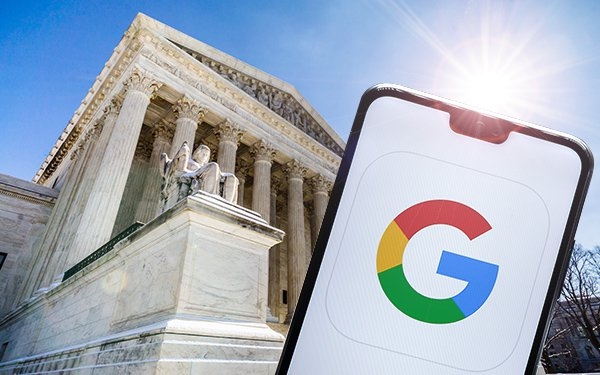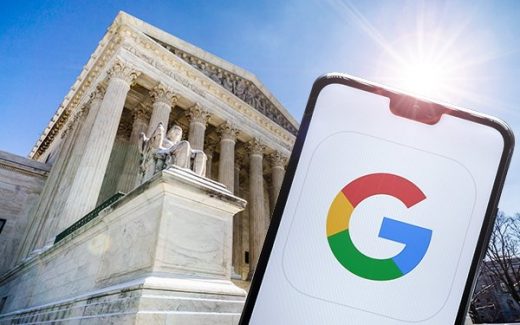Supreme Court Weighs Terror Victim’s Suit Against Google Over Recommendations
Supreme Court Weighs Terror Victim’s Suit Against Google Over Recommendations

The Supreme Court spent nearly three hours Tuesday morning wrestling with whether Google should be required to face a lawsuit by a terror victim’s family, which claims YouTube encouraged terrorism by allegedly recommending ISIS videos to users.
Google argues that Section 230 of the Communications Decency Act protects companies from liability for recommendations. That law provides that web companies aren’t responsible for content posted by users.
Google, along with dozens of supporters that filed friend-of-the-court briefs with the Supreme Court, argued that the law protects companies for decisions about how to organize display user-created content, as well as for merely hosting it. Without recommendations, Google said in papers filed last month, the internet “would devolve into a disorganized mess and a litigation minefield.”
But family members of Nohemi Gonzalez, who was killed in a 2015 attack in Paris, argue that Google isn’t protected from claims stemming from algorithmic recommendations of user-created content.
The legal battle dates to 2016, when Gonzalez’s family sued Google. A trial judge dismissed the lawsuit, and the 9th Circuit Court of Appeals refused to revive the family’s case.
The Supreme Court agreed in October to take up the matter, along with a related lawsuit over terrorist content on social media services.
That other matter, Twitter v. Taamneh, centers on whether Google, Meta and Twitter must face lawsuits by family members of Jordanian citizen Nawras Alassaf, who was killed in in a January 2017 terrorist attack by the Islamic State (ISIS) at the Reina nightclub in Istanbul. The Supreme Court will hear arguments in that case on Wednesday
Several justices acknowledged during Tuesday’s argument that their decision could have far-reaching ramifications.
For instance, Justice Brett Kavanaugh questioned Gonzalez’s attorney, University of Washington law professor Eric Schnapper, about the implications of a ruling, noting that a lot of friend-of-the-court briefs suggested a decision against Google would “cause a lot of economic dislocation in the country.”
In a move that surprised some observers, Justice Clarence Thomas, who previously criticized expansive interpretations of Section 230, asked questions that suggested he was siding with Google.
Thomas kicked off the questioning by asking Schnapper why Google’s use of algorithmic recommendations could strip it of Section 230 protection.
“If you’re interested in cooking, you don’t want thumbnails on light jazz,” Thomas said, referring to the graphics that YouTube displays when it makes recommendations. “I don’t see how that is any different from what is happening in this case.”
Justice Samuel Alito also appeared to express skepticism of the Gonzalez family’s argument.
Alito asked Schnapper whether, under his argument, Google could be required to face suit for displaying videos in any fashion other than randomly.
“Suppose that Google could … display these thumbnails purely at random, but if it does anything than displaying them purely at random, isn’t it organizing and presenting information to people who access YouTube?” Alito asked.
Schnapper answered yes, but said that Google shouldn’t be liable for the “thumbnail,” but for “encouraging people to engage.”
Alito responded that he doesn’t see where Schnapper is “drawing the line.”
Santa Clara Law professor Eric Goldman, who sided with Google in a friend-of-the-court brief, said in a blog post Tuesday afternoon that he was “slightly relieved” by the justices’ questions.
“I did not hear five votes in favor of the plaintiffs position,” Goldman wrote.
(15)


